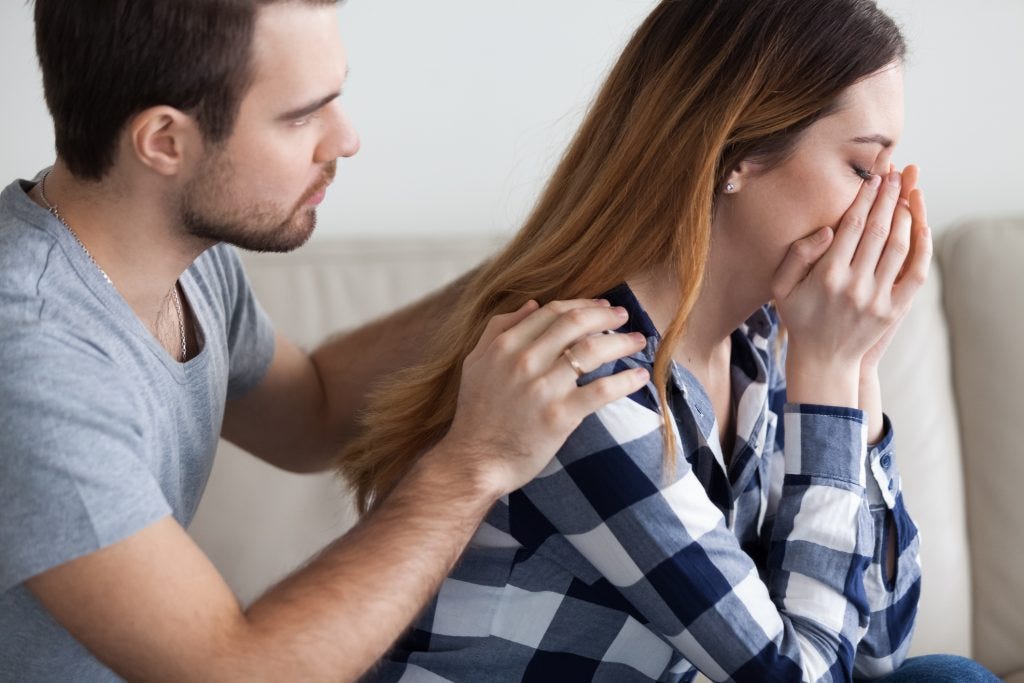The weakness of every woman that 99% of men don’t know about…
 Relationships are built on trust, communication, and mutual respect. While each individual is unique, there are common emotional dynamics that play an important role in shaping the connection between partners. When it comes to understanding what makes a person feel vulnerable, it is crucial to look beyond surface traits and recognize those emotional needs that contribute to a healthy, balanced relationship.
This article will explore the emotional dynamics that play a key role in relationships and discuss a common “weakness” in understanding women that many men may not be aware of. This vulnerability is not a flaw, but rather a reflection of the complexity of emotional health in a relationship. By understanding this aspect, both parties can build a stronger connection based on empathy and mutual support.
What is this weakness? Emotional sensitivity
The “weakness” we are referring to is the emotional sensitivity that many women naturally possess. This is not a negative trait, but rather a sign of a woman’s tendency to process emotions deeply. Psychological and relationship research shows that emotional sensitivity can manifest in many ways, such as high levels of empathy, deep concern for loved ones, and a strong sense of connection to the environment. This trait allows women to be highly sensitive to the emotions of others, but it also makes them vulnerable to emotional stress.
Emotional sensitivity and its impact on relationships
Emotional sensitivity is closely related to a woman's ability to connect with her own emotions and the emotions of others. It allows her to be more intuitive about what's going on around her and to respond with deep care and understanding. However, it can also make her more vulnerable in certain situations, especially when the emotional environment is volatile. For example, misunderstandings, criticism, or lack of support may have a stronger emotional impact on her than on others, who may be less sensitive to emotional cues.
Relationships are built on trust, communication, and mutual respect. While each individual is unique, there are common emotional dynamics that play an important role in shaping the connection between partners. When it comes to understanding what makes a person feel vulnerable, it is crucial to look beyond surface traits and recognize those emotional needs that contribute to a healthy, balanced relationship.
This article will explore the emotional dynamics that play a key role in relationships and discuss a common “weakness” in understanding women that many men may not be aware of. This vulnerability is not a flaw, but rather a reflection of the complexity of emotional health in a relationship. By understanding this aspect, both parties can build a stronger connection based on empathy and mutual support.
What is this weakness? Emotional sensitivity
The “weakness” we are referring to is the emotional sensitivity that many women naturally possess. This is not a negative trait, but rather a sign of a woman’s tendency to process emotions deeply. Psychological and relationship research shows that emotional sensitivity can manifest in many ways, such as high levels of empathy, deep concern for loved ones, and a strong sense of connection to the environment. This trait allows women to be highly sensitive to the emotions of others, but it also makes them vulnerable to emotional stress.
Emotional sensitivity and its impact on relationships
Emotional sensitivity is closely related to a woman's ability to connect with her own emotions and the emotions of others. It allows her to be more intuitive about what's going on around her and to respond with deep care and understanding. However, it can also make her more vulnerable in certain situations, especially when the emotional environment is volatile. For example, misunderstandings, criticism, or lack of support may have a stronger emotional impact on her than on others, who may be less sensitive to emotional cues.
 Why do most men overlook this?
One reason many men may overlook this aspect is that emotional sensitivity is often difficult to detect, especially in a society that encourages people to suppress or downplay their emotions. Many men may not be able to recognize subtle signals that indicate emotional distress or vulnerability, and instead believe that outward displays of strength or confidence reflect a woman's inner emotional state.
In addition, traditional gender roles and social norms have led many men to believe that emotions should be handled in a calm or less outward way. As a result, there may be a gap in understanding when it comes to identifying a partner's deeper emotional needs.
Understanding the importance of emotional validation
For many women, emotional validation is a key element to feeling loved and valued in a relationship. Validation means acknowledging and accepting her emotions without judgment or negation. Women who are more emotionally sensitive often need to feel understood, especially when expressing vulnerability or concern. When this need is met, it fosters a sense of safety and trust in the relationship.
Conversely, emotional neglect or negation can make her feel ignored or misunderstood, which can lead to emotional distress. That’s why both partners need to work together to create an environment that encourages open, empathetic communication, where emotions are validated rather than ignored.
How can men better understand and respond?
Why do most men overlook this?
One reason many men may overlook this aspect is that emotional sensitivity is often difficult to detect, especially in a society that encourages people to suppress or downplay their emotions. Many men may not be able to recognize subtle signals that indicate emotional distress or vulnerability, and instead believe that outward displays of strength or confidence reflect a woman's inner emotional state.
In addition, traditional gender roles and social norms have led many men to believe that emotions should be handled in a calm or less outward way. As a result, there may be a gap in understanding when it comes to identifying a partner's deeper emotional needs.
Understanding the importance of emotional validation
For many women, emotional validation is a key element to feeling loved and valued in a relationship. Validation means acknowledging and accepting her emotions without judgment or negation. Women who are more emotionally sensitive often need to feel understood, especially when expressing vulnerability or concern. When this need is met, it fosters a sense of safety and trust in the relationship.
Conversely, emotional neglect or negation can make her feel ignored or misunderstood, which can lead to emotional distress. That’s why both partners need to work together to create an environment that encourages open, empathetic communication, where emotions are validated rather than ignored.
How can men better understand and respond?
 Active listening: One of the most powerful ways for men to support women in a relationship is to practice active listening. This means focusing on what she’s saying without interrupting or offering solutions right away. Sometimes women just need to feel heard and understood, and showing patience and empathy in a conversation can make a huge difference.
Pay attention to emotional cues: Paying attention to her emotional cues—both verbal and nonverbal—can help men better understand how she’s feeling. This may mean recognizing if she’s feeling stressed, anxious, or frustrated, and offering appropriate support. Sometimes women may not express their feelings directly, so observing changes in behavior or body language can provide valuable insight.
Active listening: One of the most powerful ways for men to support women in a relationship is to practice active listening. This means focusing on what she’s saying without interrupting or offering solutions right away. Sometimes women just need to feel heard and understood, and showing patience and empathy in a conversation can make a huge difference.
Pay attention to emotional cues: Paying attention to her emotional cues—both verbal and nonverbal—can help men better understand how she’s feeling. This may mean recognizing if she’s feeling stressed, anxious, or frustrated, and offering appropriate support. Sometimes women may not express their feelings directly, so observing changes in behavior or body language can provide valuable insight.
Relationships are built on trust, communication, and mutual respect. While each individual is unique, there are common emotional dynamics that play an important role in shaping the connection between partners. When it comes to understanding what makes a person feel vulnerable, it is crucial to look beyond surface traits and recognize those emotional needs that contribute to a healthy, balanced relationship.
This article will explore the emotional dynamics that play a key role in relationships and discuss a common “weakness” in understanding women that many men may not be aware of. This vulnerability is not a flaw, but rather a reflection of the complexity of emotional health in a relationship. By understanding this aspect, both parties can build a stronger connection based on empathy and mutual support.
What is this weakness? Emotional sensitivity
The “weakness” we are referring to is the emotional sensitivity that many women naturally possess. This is not a negative trait, but rather a sign of a woman’s tendency to process emotions deeply. Psychological and relationship research shows that emotional sensitivity can manifest in many ways, such as high levels of empathy, deep concern for loved ones, and a strong sense of connection to the environment. This trait allows women to be highly sensitive to the emotions of others, but it also makes them vulnerable to emotional stress.
Emotional sensitivity and its impact on relationships
Emotional sensitivity is closely related to a woman’s ability to connect with her own emotions and the emotions of others. It allows her to be more intuitive about what’s going on around her and to respond with deep care and understanding. However, it can also make her more vulnerable in certain situations, especially when the emotional environment is volatile. For example, misunderstandings, criticism, or lack of support may have a stronger emotional impact on her than on others, who may be less sensitive to emotional cues.

Why do most men overlook this?
One reason many men may overlook this aspect is that emotional sensitivity is often difficult to detect, especially in a society that encourages people to suppress or downplay their emotions. Many men may not be able to recognize subtle signals that indicate emotional distress or vulnerability, and instead believe that outward displays of strength or confidence reflect a woman’s inner emotional state.
In addition, traditional gender roles and social norms have led many men to believe that emotions should be handled in a calm or less outward way. As a result, there may be a gap in understanding when it comes to identifying a partner’s deeper emotional needs.
Understanding the importance of emotional validation
For many women, emotional validation is a key element to feeling loved and valued in a relationship. Validation means acknowledging and accepting her emotions without judgment or negation. Women who are more emotionally sensitive often need to feel understood, especially when expressing vulnerability or concern. When this need is met, it fosters a sense of safety and trust in the relationship.
Conversely, emotional neglect or negation can make her feel ignored or misunderstood, which can lead to emotional distress. That’s why both partners need to work together to create an environment that encourages open, empathetic communication, where emotions are validated rather than ignored.
How can men better understand and respond?

Active listening: One of the most powerful ways for men to support women in a relationship is to practice active listening. This means focusing on what she’s saying without interrupting or offering solutions right away. Sometimes women just need to feel heard and understood, and showing patience and empathy in a conversation can make a huge difference.
Pay attention to emotional cues: Paying attention to her emotional cues—both verbal and nonverbal—can help men better understand how she’s feeling. This may mean recognizing if she’s feeling stressed, anxious, or frustrated, and offering appropriate support. Sometimes women may not express their feelings directly, so observing changes in behavior or body language can provide valuable insight.